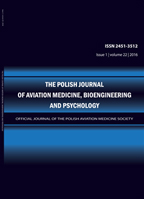2019, Volume 25, Issue 1
POLISH ADAPTATION OF THE COPENHAGEN PSYCHOSOCIAL QUESTIONNAIRE II (COPSOQ II) IN POLISH PRISON SERVICE STAFF - A TOOL FOR PSYCHOSOCIAL RISK ASSESSMENT AT THE WORKPLACE
KATARZYNA ORLAK1, DOMINIK GOŁUCH2, MIKOŁAJ STOLARSKI1
-------------------------------------------------------------------------------------------------
1Zoom in on Posts – Association for Occupational Health Prevention
2Institute of Psychology, Cardinal Stefan Wyszyński University in Warsaw
Autor korenspondencyjny: DOMINIK GOŁUCH; Institute of Psychology, Cardinal Stefan Wyszyński University in Warsaw; email: d.goluch@uksw.edu.pl
Full text
Streszczenie
Introduction: The Copenhagen Psychosocial Questionnaire (COPSOQ) is identified to be appropriate to assess psychosocial hazards at work and is recommended in WHO publications. However, the tool was never fully adopted in Poland. The purpose of this paper is to present the psychometric characteristics of COPSOQ II in Polish.
Material and Methods: A validation study of the long (128-item) COPSOQ II was conducted on a stratified sample of the Polish Prison Service staff (N=380). Reliability was tested with Cronbach's α. Validity was verified through factor analysis as well as analysis of correlations with four other relevant measures for psychosocial hazards assessment. All of them were previously widely applied in Poland by many researchers and approved for studying psychosocial environment at work, health and well-being in Polish employees.
Results: The Polish version of COPSOQ II is composed of 42 scales. The greater number of scales compared to the original version results from reliability analysis. As the original Variation scale was the only with unsatisfactory Cronbach's α so it was divided into two separate measures: Work Repetitiveness and Work Variety. Seven factors were identified and labelled as: Demands at Work, Organizational Relations, Physical Violence, Psychological Violence, Health and Well-being, Work Commitment and Development Perspectives, Relations within a Team. All associations were in the expected direction.
Conclusions: The long COPSOQ II PL may be considered as a proper tool to study psychosocial hazards at work in Poland. However, further tests on work environments other than Prison Service are recommended.
Słowa kluczowe
hazard management, work-related stress, risk management, COPSOQ, Prison Service, work-related health, occupational hazards, psychosocial hazards
